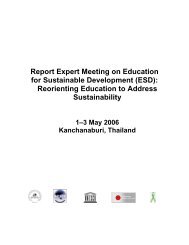Module 11 | Indigenous knowledge and sustainability - APCEIU
Module 11 | Indigenous knowledge and sustainability - APCEIU
Module 11 | Indigenous knowledge and sustainability - APCEIU
You also want an ePaper? Increase the reach of your titles
YUMPU automatically turns print PDFs into web optimized ePapers that Google loves.
Definition of <strong>Indigenous</strong><br />
All definitions of the concept of 'indigenous' regard self-identification as a<br />
fundamental criterion for determining the groups to which the term<br />
indigenous should be applied. Within the UN family, the ILO (ILO<br />
Convention 169) defines <strong>Indigenous</strong> <strong>and</strong> Tribal people as follows:<br />
Tribal people in independent countries whose social, cultural <strong>and</strong><br />
economic conditions distinguish them from other sections of the<br />
national community, <strong>and</strong> whose status is regulated wholly or partially<br />
by their own customs or traditions or by special laws or regulations;<br />
People in independent countries who are regarded as indigenous on<br />
account of their descent from the populations which inhabited the<br />
country, or geographical region to which the country belongs, at the<br />
time of conquest or colonisation or the establishment of present<br />
state boundaries <strong>and</strong> who irrespective of their legal status, retain<br />
some or all of their own social, economic, cultural <strong>and</strong> political<br />
institutions.<br />
Source: Alan, R. Emery <strong>and</strong> Associates (1997) Guidelines for Environmental<br />
Assessments <strong>and</strong> Traditional Knowledge. A Report from the Centre for<br />
Traditional Knowledge of the World Council of <strong>Indigenous</strong> People (draft),<br />
Ottawa, p. 2.








